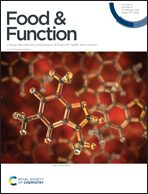Uridine attenuates obesity, ameliorates hepatic lipid accumulation and modifies the gut microbiota composition in mice fed with a high-fat diet†
Abstract
Uridine (UR) is a pyrimidine nucleoside that plays an important role in regulating glucose and lipid metabolism. The aim of this study was to investigate the effect of UR on obesity, fat accumulation in liver, and gut microbiota composition in high-fat diet (HFD)-fed mice. ICR mice were, respectively, divided into 3 groups for 8 weeks, that is, control (CON, n = 12), high fat diet (HFD, n = 16), and HFD + UR groups (0.4 mg mL−1 in drinking water, n = 16). UR supplementation significantly reduced the body weight and suppressed the accumulation of subcutaneous, epididymal, and mesenteric WAT in HFD-fed mice (P < 0.05). Meanwhile, UR also decreased the lipid droplet accumulation in the liver and liver organoids (P < 0.05). In addition, UR supplementation increased bacterial diversity and Bacteroidetes abundance, and decreased the Firmicutes-to-Bacteroidetes ratio in HFD-fed mice significantly (P < 0.05). UR promoted the growth of butyrate-producing bacteria of Odoribacter, unidentified-Ruminococcaceae, Intestinimonas, Ruminiclostridium, and unidentified-Lachnospiraceae. A close correlation between several specific bacterial phyla or genera and the levels of WAT weight, hepatic TC, or hepatic TG genera was revealed through Spearman's correlation analysis. These results demonstrated that UR supplementation could be beneficial by attenuating HFD-induced obesity and nonalcoholic fatty liver disease.



 Please wait while we load your content...
Please wait while we load your content...